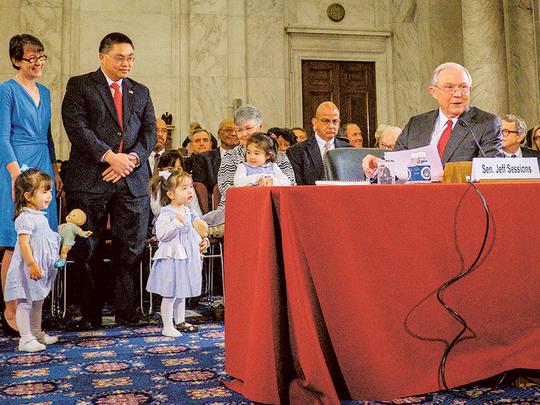
Washington: Sen. Jeff Sessions, President-elect Donald Trump’s nominee for attorney general, pledged on Tuesday to “say no” to Trump if he tries to go beyond the law, and he spoke out against torture, a ban on Muslim immigration and other ideas that had been floated by Trump.
Sessions, a deeply conservative Republican from Alabama who was an early Trump supporter, appears headed for confirmation after completing 10-and-a-half hours of testimony before the Senate Judiciary Committee. Sessions and his allies had girded for a coordinated attack on his civil rights record, but Democrats tempered their criticism and Republicans mounted a pre-emptive defence, describing him repeatedly as a man of integrity.
In his two decades on Capitol Hill, Sessions has questioned whether the Constitution guarantees citizenship to anyone born in the US, has said courts have interpreted the separation of church and state too broadly and has declared same-sex marriage a threat to American culture. He also voted against reauthorising the Violence Against Women Act.
Much of the hearing focused on Sessions’ long record as a prosecutor and a senator, but Trump proved a dominant figure in absentia for much of the debate as Democrats sought to question the president-elect by proxy. They asked whether Sessions supported Trump’s most controversial statements and questioned whether he had the independence to rein in the strong-willed Trump if he seeks to exceed his presidential authority.
In his cool, Southern drawl, Sessions vowed repeatedly that he would, saying that an attorney general “cannot be a mere rubber stamp” for the president.
“If an attorney general is asked to do something that’s plainly unlawful,” he said, “that person would have to resign ultimately before agreeing to execute a policy that the attorney general believes would be unlawful or unconstitutional.”
But he indicated he did not believe he would reach that impasse. If he advises Trump that a policy is illegal, he said, “I am confident that he would” heed that advice.
A Methodist, he also pledged to set aside his personal beliefs and aggressively enforce all federal laws — even in areas like abortion, gay rights and hate crimes where he has made his opposition well known.
“I don’t think it would be hard for me to be impartial and enforce laws that I didn’t vote for,” he said. “I think I can separate my personal votes of maybe years ago from what my responsibilities is today.”
He was asked, for instance, about a law he opposed in the Senate making attacks based on sexual orientation a hate crime. “The law has been passed, the Congress has spoken, and you can be sure I will enforce it,” Sessions said.
Many of Sessions’ answers appeared calculated to distance himself from some of Trump’s most contentious threats and pledges on the campaign trail.
He said, for instance, that current law “absolutely” bans waterboarding and the use of other torture techniques against prisoners — even though Trump promised to reinstitute the practice and Sessions himself supported it for years.
Asked about last week’s report by intelligence agencies that Russia tried to influence the American election, he said that “I have no reason to doubt that and no information that would indicate otherwise” — a sharp contrast from Trump’s weeks of scepticism. Trump last week called the uproar over Russia’s role a “political witch hunt”.
He said he also opposed creating a “registry” of American Muslims or banning Muslim immigrants, as Trump proposed repeatedly during the campaign in response to terrorist attacks.
“I have no belief and do not support the idea that Muslims as a religious group should be denied admission to the United States,” Sessions said. But he said he supported using “extreme vetting” of immigrants that might take into account religious beliefs — an idea Trump now appears to have endorsed.
Sessions also appeared to play down the prospects that his Justice Department would seek to “jail” Hillary Clinton over her private email server, another pledge that Trump made repeatedly during the campaign.
He surprised lawmakers by declaring that he would recuse himself from any decisions on Clinton’s emails or the Clinton Foundation because he said that critical statements he made about her during the campaign might pose a conflict.
Sessions had previously supported appointing a special prosecutor to investigate Clinton. The Federal Bureau of Investigation’s (FBI’s) investigation into her private email server is closed, and while a preliminary investigation into the Clinton Foundation is open, senior law enforcement officials say officials there is little basis for the case to move forward.
He deflected questions about Trump with a calm stoicism, but he grew angry and emotional when Democrats pressed him on a more personal matter: accusations of racial insensitivity toward his employees and others as a federal prosecutor, which doomed his nomination for a federal judgeship in 1986.
Protesters in the ornate Senate hearing room, who disrupted the proceedings more than a dozen times during the day, erupted in chants of “Sessions is a racist!” and “No Trump, no KKK, no fascist USA!” Two men dressed as Klansmen in white robes and hoods shouted their mocking support for Sessions before security officers hustled them out of the room.
With his voice rising, Sessions called accusations that he had made racist remarks in the 1980s “damnably false”. Sen. Susan Collins of Maine, a Republican friend who introduced Sessions for the hearing, came to his defence, pointing to Sessions’ prosecution of Klan members in an Alabama murder and his appointment of the first African-American chief counsel to the Judiciary Committee’s Republican staff.
“These are not the actions of an individual motivated by racial animus,” she said.
Although Sessions has completed his testimony, the hearings will continue on Wednesday with testimony by advocates on both sides.












